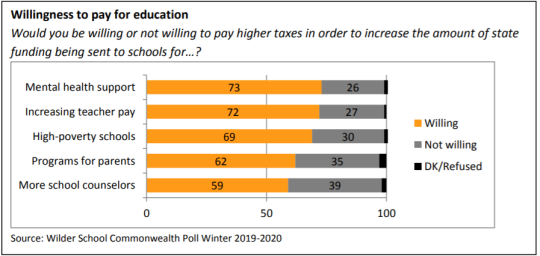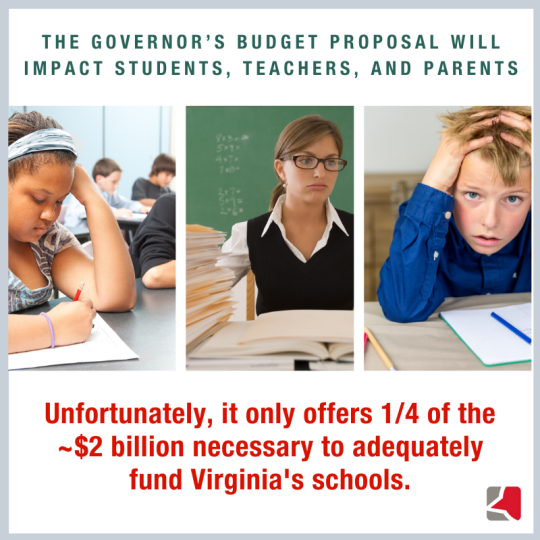January 10, 2020
K-12 Funding in 2020 Legislative Session: Lawmakers Have Opportunity to Turn Piecemeal Progress into a Profound Achievement
School funding will be a key area of focus as legislators debate and offer revisions to the governor’s introduced budget for 2020-2022 during session, which began on Wednesday. The governor’s K-12 proposals add approximately $470 million in new investments in K-12 (across the two-year state budget) and direct resources to critical services such as school counselors and need-based funding (At-Risk Add-On). These investments stand at only about one-quarter of the $2 billion that the Virginia Board of Education identified as needed to adequately fund the state’s Standards of Quality (SOQ), and only fully funds the Board’s proposal for school counselors.
As a result, the introduced budget’s proposed education investments are best understood as a starting point. Virginia ranks 40th in state funding per student nationwide and it would take an additional $2.5 billion per year ($5 billion total in the two-year budget) to reach the middle of the pack (25th) in state funding. That’s why we have called for bold action to fix school funding in Virginia earlier this year along with the Fund Our Schools coalition. Del. Aird (HB1316) and Sen. McClellan (SB728) have submitted legislation to do just that by fully funding the SOQ revisions put forward by the Virginia Board of Education. And a recent VCU poll shows Virginia residents see the needs of our schools and are willing to do their share to fund them.

Below we summarize the investments in the governor’s introduced budget and legislative proposals, like those by Del. Aird and Sen. McClellan, to strengthen them.
Rebenchmarking
The advertised investment of $1.2 billion across the two-year state budget includes $808.5 million for technical revisions to the funding formula (called “rebenchmarking”) to keep funding current. The updates include enrollment estimates, student demographics, and prevailing salary calculations, among other factors. These dollars are not new funding and represent a current-services budget.
Teacher Compensation
The proposed budget includes a 3% salary increase for teachers and support staff positions starting the second year of the budget. There is no salary adjustment included in the first year of the budget. This does not put Virginia on pace to reach the state’s goal of providing a salary “at a minimum, at or above the national average teacher salary” as listed in the Code of Virginia. The National Education Association (NEA) survey shows average salaries in Virginia were 14% below the national average in the 2017-2018 school year (the most recent year with actuals compared to estimates).
Teacher salaries compare even more poorly to the private sector in Virginia. The Economic Policy Institute released a report last year showing that Virginia teachers are paid 31.3% less than comparable college graduates, which equals the third largest wage penalty in the nation.
Legislation has been filed by Del. Mugler (HB233) to change the goal of providing a teacher salary at or above the national average into a requirement by July 1, 2025.
Need-Based School Funding
The proposed budget also includes a substantial increase in Virginia’s need-based funding program called the At-Risk Add-On. The proposal increases this supplemental funding up to 1 – 25% more in state funding per student enrolled in free lunch, totaling $140 million across the two-year state budget. This is needed because spending in Virginia’s highest poverty divisions falls far short of what national models show is needed and is even less than what the lowest poverty divisions are spending.
While positive, the $140 million increase is about half of what the Virginia Board of Education identified as needed to equitably distribute resources across the state to ensure that students who need additional support are getting it. In their approved revisions to the SOQ, the Board created an Equity Fund that would have allocated an additional $270 million in the budget. The governor instead chose to allocate $125 million to a new fund that allocates resources to schools based on the number of students rather than the needs of students.
The creation of this additional fund that doesn’t take into account student need seems unnecessary and misplaced, given that the bulk of state K-12 funding (85%) is awarded through the SOQ based on enrollment and lottery dollars are currently used to allocate additional funds based on enrollment. Last legislative session, we saw the negative impact that a House proposal could have had on school divisions with the most students of color (as a percentage) and schools divisions with highest child poverty rates when the House Appropriations Committee proposed a shift in funding from need-based aid in the At-Risk Add-On to enrollment-based aid in the Lottery Per Pupil Allocation. Instead of running a similar play, the resources in the governor’s budget can be better focused by fully funding the proposal put forward by the Virginia Board of Education.
Del. Aird’s (HB1316) and Sen. McClellan’s (SB728) legislation fully funds the Equity Fund as proposed by the Board.
School Counselors
The introduced budget reaches the nationally- and Board-recommended standard of having one school counselor for every 250 students, investing $100 million in state funding (across the two-year budget) to reach this goal by the second year. Student caseloads have grown significantly for counselors over the past decade, up nearly 30% from 2008 to 2016. Schools with manageable caseloads have better graduation rates, higher attendance, and fewer disciplinary incidents than schools with higher caseloads, and this is especially true in high-poverty schools.
Del. McQuinn’s (HB1508) legislation funds the governor’s proposal to provide state funding for counselors at the recommended ratio (1:250) by the second year of the budget, while both Del. Aird (HB1316) and Sen. McClellan (SB728) fully fund the Board’s recommendation in both years.
English Learner Teachers
The proposed budget increases instructional positions for English Learner (EL) students from 17 positions for every 1,000 students to 20 positions for every 1,000 students in both years of the budget. The increase is a starting point, but is less than half of what the Virginia Board of Education recommends to adequately support the state’s EL students (equal to $31.4 million per year or $62.8 million over the-two year budget, at a minimum).
Also left out of the proposed budget was the Board’s recommendation to tie staffing ratios to student language ability, so students who need the most support get the most support. This would have funded more instructional positions for students with the lowest English proficiency, and provided continued support for students who are more proficient and on their way to fluency.
TCI analysis has shown that the level of funding as it stands produces persistent gaps in Standards of Learning (SOL) test scores and graduation rates for EL students. In 2019, pass rates for EL students were 47.5 percentage points lower than non-EL students on the reading SOL test, demonstrating that these students aren’t getting the instructional support and funding resources they need. Virginia lags behind the rest in EL funding, spending almost 12% more per EL student, compared to the national average of 39% more per student beyond the state support base.
Del. Aird’s (HB1316), Sen. McClellan’s (SB728), and Del. Guzman’s (HB975) legislation would fully fund the Virginia Board of Education’s proposal for additional teachers for English Learner students.
Support Staffing
Framed as a cost savings effort at a time of financial strain, during the recession the state enacted a “cap” on support staff in 2010 that arbitrarily limited state funding to one support staff position for every 4.03 instructional positions. The support cap has been included in every budget since 2010 and now local school divisions lose out on more than $400 million in state aid for vital support staffing. Because of the cap, support staffing has declined by 2,800 positions since 2009 while enrollment has grown by more than 55,000 students. The staffing impacts have been most felt by students of color. Support staffing has declined at four times the rate in Virginia’s school divisions with the most students of color (as a percentage) compared to divisions with the fewest. A division by division listing can be found here.
The Virginia Board of Education called for the complete elimination of the support cap in their proposed revisions to the SOQ. The introduced budget takes no action on this important recommendation and keeps the cap in place through 2022, 13 years after this “temporary” cap was created.
Del. Aird and Sen. McClellan have submitted budget amendments to eliminate the support cap.
Diverse Schools
The governor’s proposed budget also includes a proposal to report on and create diversity goals at Virginia’s year-round Governor’s Schools. As TCI has written about previously, racial and socioeconomic school segregation continues to be a problem, with students of color having significantly less access to advanced placement and high level math and science courses than white students. Increased racial diversity has widespread benefits for all students and especially students of color, including higher academic achievement, increased likelihood of going to college, better workforce preparation, and an improved likelihood of resource equity.

Bold Action is Needed
Virginia has the resources to be a leader in its support for public education, yet year after year too many herald incremental investments as fixes, when they fall far short of what is needed to truly change the landscape. Legislators do not need to settle for Virginia being a bottom-tier state in state education funding. If we look to revenue solutions, we can live in a commonwealth where each educator is fairly compensated and has the resources to support their family, every student has access to the full array of services they need to be successful whether that is counseling, mental health, or language specialists, and no student is left out. Legislators have the opportunity before them to fully fund Virginia’s Standards of Quality, an opportunity they cannot afford to miss for our students, schools, and Virginia’s future.

